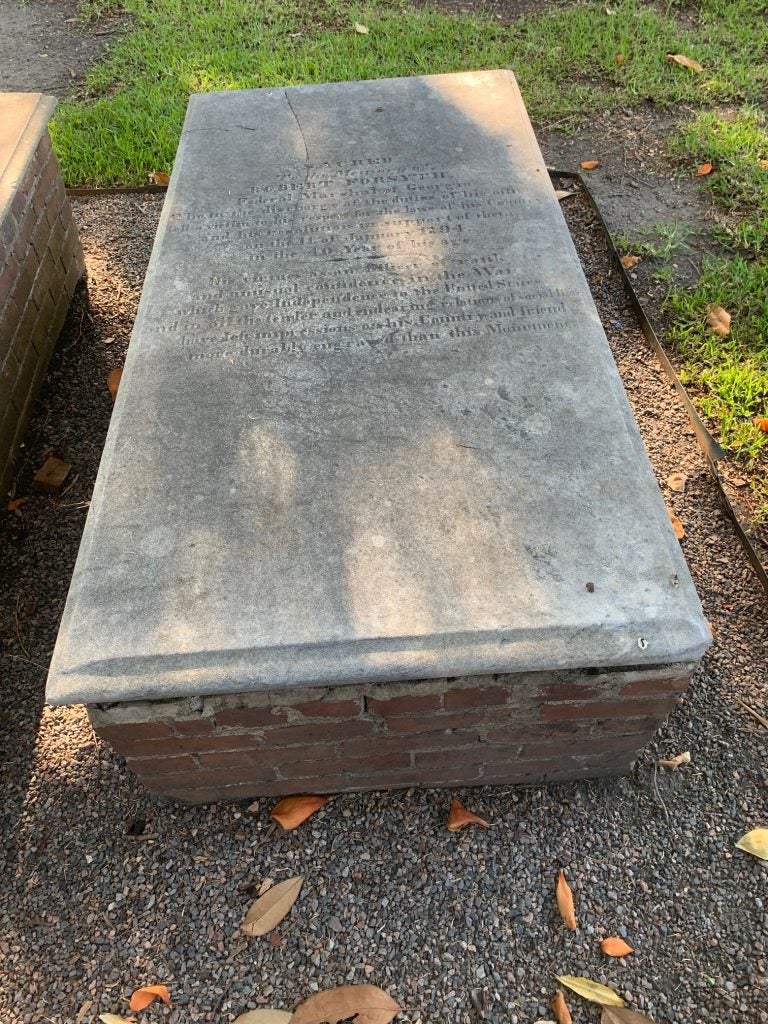Augusta has many claims to fame throughout its long history. Of course, the Garden City is known for James Brown and the Masters Tournament, but it is also the city in which the first federal agent was killed in the line of duty.
Long before the term “Wild Wild West” was coined, pre- and post-colonial Augusta had its own wild side. In fact, the whole of Georgia existed as a buffer state to Spanish Florida and was a largely untamed frontier.
The U.S. Marshal’s Office was created by the First Congress under the Judiciary Act of 1789 and became America’s first national civilian police force.
MORE: Something You Might Not Have Known: Engine Company 7
Robert Forsyth became the first U.S. marshal for the District of Georgia, appointed by George Washington at the age of 35. He spent most of his time between Savannah and Augusta. Forsyth had served as captain of Light Dragoons in Henry “Light-Horse Harry” Lee’s cavalry during the Revolutionary War.
Forsyth was a well-respected figure in Augusta where he also served as the justice of the peace, was offered a seat as a trustee of the Academy of Richmond County and was most certainly on hand when President Washington visited Augusta as part of his tour of the states in 1791.
However, it is likely that the position of the U.S. marshal was a dull part of his overall career as there were not many warrants and writs to be served in the tiny frontier town of Augusta.
All of that would change in January 1794 when Forsyth was tasked with serving civil court papers to two brothers, Beverly and William Allen.
MORE: Something you might not have known: Paul Hamilton Hayne, a forgotten poet of the South
While not much is known about the Allen brothers, family reco publicly available at geneology.com indicate an Augusta merchant filed suit when the two failed to pay him for goods they borrowed. According to those records, Beverly, a Methodist preacher, came to Augusta to preach. When he was spotted at the home of a “Mrs. Dixon,” Forsyth took the unusual extra step of taking two deputies with him.
According to the U.S. Marshal’s Office, Forsyth and his men arrived at the Dixon home and found Beverly inside. Ever polite, Forsyth Beverly to come outside and speak with him, as it was improper to discuss such business in front of a lady who was not involved in the lawsuit.
Rather than meet Forsyth on the front porch, Beverly fled to an upstairs bedroom and barricaded himself inside.

Forsyth pursued them upstairs not knowing whether or the brothers were armed. As Forsyth stood outside the bedroom door attempting to negotiate, Beverly Allen aimed a pistol musket at the locked door and fired one shot.
It was a lucky shot, as pistol muskets of the day were terribly inaccurate, and Allen was only aiming at a door. The musket ball traveled through the thin wooden door and struck Forsyth in the forehead.
According to the U.S. Marshal’s Office, “Forsyth was dead before his body hit the floor.”
Forsyth was only 40 years old when he died.
Allen did not have time to reload the pistol before the two deputies stormed the room and apprehended both men. However, Beverly would not remain in custody for long. He broke out of jail and fled the city, ending up in Logan County, Ky., where he became a physician.
Forsyth’s son, John, who was only 14 when his father was murdered, would go on to become a member of the U.S. House of Representatives and the Senate. He was elected as Georgia’s 33rd governor and served both the Jackson and Van Buren presidential administrations as Secretary of State.
Robert Forsyth is buried in the cemetery at St. Paul’s Church in downtown Augusta.
…And that is something you might not have known.
Scott Hudson is the senior reporter for The Augusta Press. Reach him at scott@theaugustapress.com











